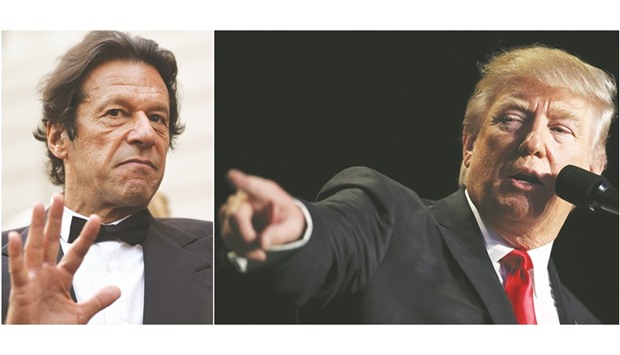Last month, President Donald Trump signed an executive order that barred the citizens of seven Muslim countries from travelling to the United States for a period of 90 days. He also suspended the refugee programme for war-wrecked Syrians.
Even as the move provoked an international outcry with legal wrangling in the US itself and an intense debate surrounding the likely fallout and possible expansion of the travel ban to other countries, including Pakistan, one man, who fancies himself as the country’s future leader, was hoping that it would come to pass!
The deal with Imran Khan, the firebrand opposition leader and chairman of his Pakistan Tehrik-i-Insaf (PTI) party, is to not only expect the expected but also the unexpected.
“I want to tell all Pakistanis today, I pray that Trump bans Pakistani visas so that we can focus on fixing our country,” Khan thundered at a public rally in Sahiwal, a city in central Punjab province, two days after Trump sent shock waves around the world.
Coming from the PTI chief, the colourful, if sweeping, proposal was the kind of demagoguery that has earned him the sobriquet of “Pakistan’s Trump”. There is also no dearth of political humour – understandably, more in currency among his rivals – that suggests the correct analogy is actually in the reverse: that Trump is more likely “America’s Khan”.
While a verdict will probably remain elusive for the jury until such time Imran Khan makes the cut to the chief executive’s hot seat, it is evident the two have much in common – that cavalier streak borne out of impatience for process in favour of quick results, a temperamental mien, and that judgemental disposition.
The PTI chairman of course, is never short of an explanation, theory or justification for his clarion calls. In the case of the ban “prayer”, he felt it would be a blessing in disguise.
“The day we bring back the merit system back to Pakistan, all our best citizens will return and work for the betterment of this country,” Khan enthused.
“We will have to fix Pakistan and stand on our own two feet. And the day that we decide this is our home and we have to fix it, we won’t beg for loans from the US and the International Monetary Fund,” he said, fuelling the popular narrative.
Most educated Pakistanis, the PTI chairman noted, wanted to leave the country because they think they can only acquire meaningful employment at home if they have powerful connections.
In a potshot at Prime Minister Nawaz Sharif, Khan said “the day there is a government that decides it has to live and die in Pakistan, it will fix this country”.
“They may have elected Trump, but we have elected Nawaz Sharif,” he said to an amused crowd.
The PTI chief concluded the diatribe by hailing Iran’s tit-for-tat move in response to Trump’s immigration ban; barring US nationals travelling to Iran until the ban was lifted.
“Iran is an independent nation and we need to become like them,” Khan drove home in a pointed reference to the Sharif government’s apparent appeasement.
The Foreign Office in Islamabad termed the contentious Trump travel ban as Washington’s “sovereign right”.
The general – and strong – impression is that Khan is a straight talker, outspoken, and mostly well-meaning when dilating on the country’s future, but while these traits make him one of the most popular Pakistanis on the planet, he is also prone to be reckless, shifty on policy if it backfires or is not producing results quickly enough for his liking, and given to jumping the gun on mere hearsay about his political rivals.
While legions of mostly young and urban-based Pakistanis gravitate to his every word – inspired more likely from his legendary exploits as a former cricket captain and fetching public service (evident in the building of world class cancer hospitals, a university for the under-privileged and other philanthropic causes) – he has shown a tendency to swing from one extreme position to another in deep frustration over what he regularly berates is a rotten political order.
But while the good he has rendered can hardly be faulted – most of all this materialised even before he entered politics, thus ruling out any calibrated ambition – his penchant for trying to go for broke as fast as he once bowled on the world’s cricket stage makes even his often reluctant political partners wary.
In an ideal world, Khan’s ‘straight talking’ would probably hold him in good stead, but in the rough and tumble of Pakistani political arena, the consequences are slightly more complex. He has, of course, come a long way from that Lahore public rally on a winter eve in 2011 that stunned Pakistan with its numbers and electric atmosphere against the run-of-play, turning him into a force to reckon with.
But since turning up short at the subsequent 2013 national elections, where however, his party secured the second highest number of votes and stood third in the overall seat tally in the National Assembly (lower house of the country’s bicameral legislature), Khan has come across as a bitter man, first challenging the fairness of the exercise – again without a favourable verdict – when he mounted a public movement to force the Sharif government to hold a judicial inquiry, and; now, taking the First Family to court over allegations of them having benefited from ill-gotten money to buy properties named in the Panama Papers.
Interestingly, in a move that, at once, reinforced his credentials of a nationalist leader, but also moved some distance from wanting the ban expanded to Pakistan, the PTI was the only party that tried to present a resolution in the National Assembly against Trump’s immigration ban - something the ruling party was loathe to and stonewalled.
The battle to best pan the ban – as well as understand what Imran Khan really wants – continues.
* The writer is Community Editor.

SIMILARLY BLUNT: Pakistan opposition leader Imran Khan, left, and US President Donald Trump.

